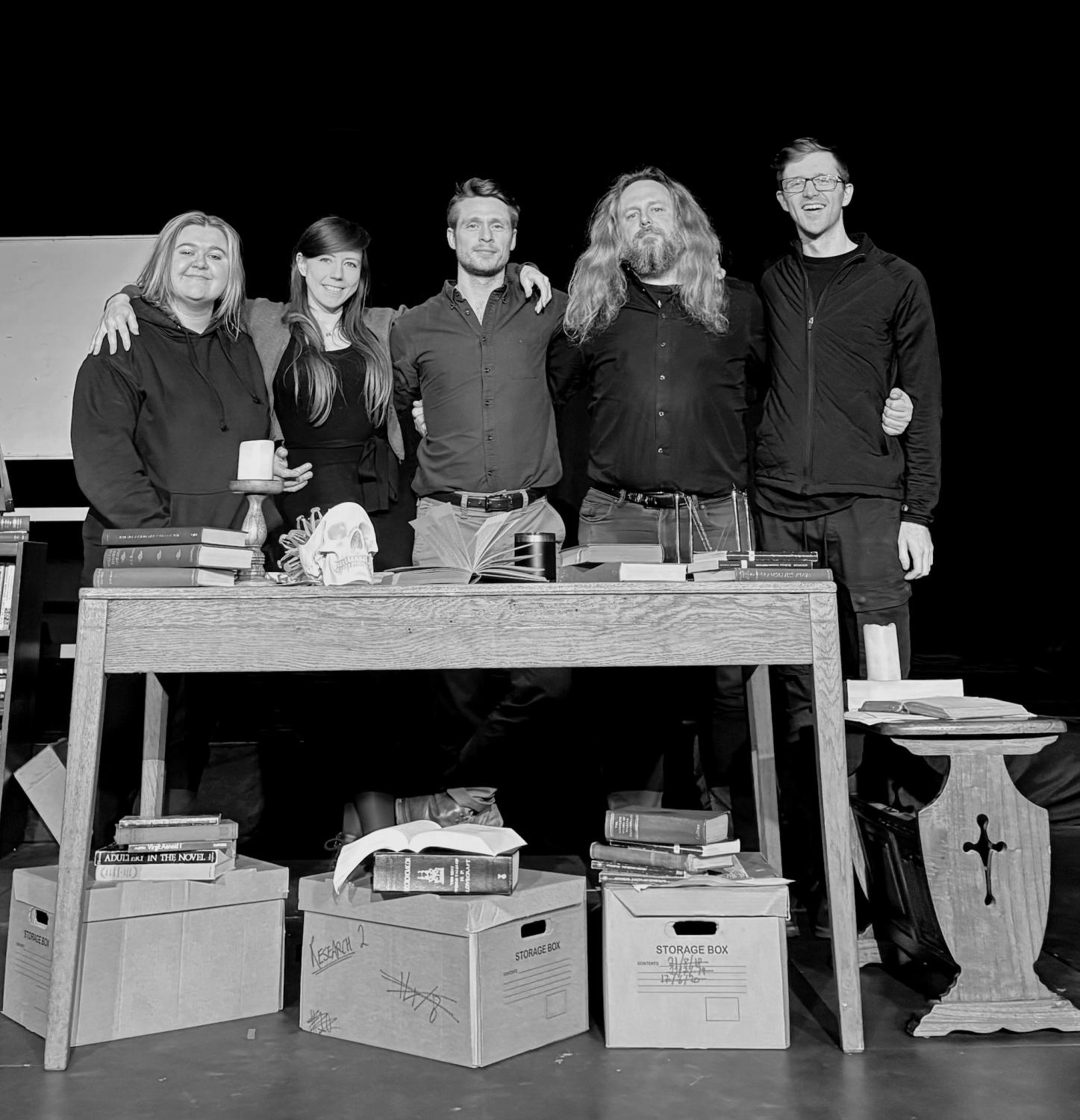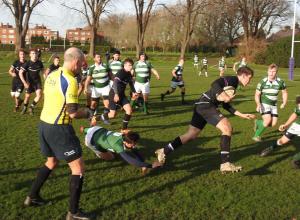
Mr Digby Don is mighty impressed by a brilliant school production of Dr Faustus which proved that this dark tale of a man’s descent into damnation can also be a lot of fun.
Can you imagine selling your soul to the Devil for twenty four years of power, absolute power? This is the simple yet complex question that we can all understand, a question that is central to the brilliance of a play that has gripped audiences for over four hundred years. Not bad for a twenty-eight-year old playwright, writing his third play. You can’t help but wonder what Chrstopher Marlowe might have achieved if he hadn’t been murdered in a pub a year later, in 1593. What if he’d enjoyed a two-decade career like his contemporary, William Shakespeare?
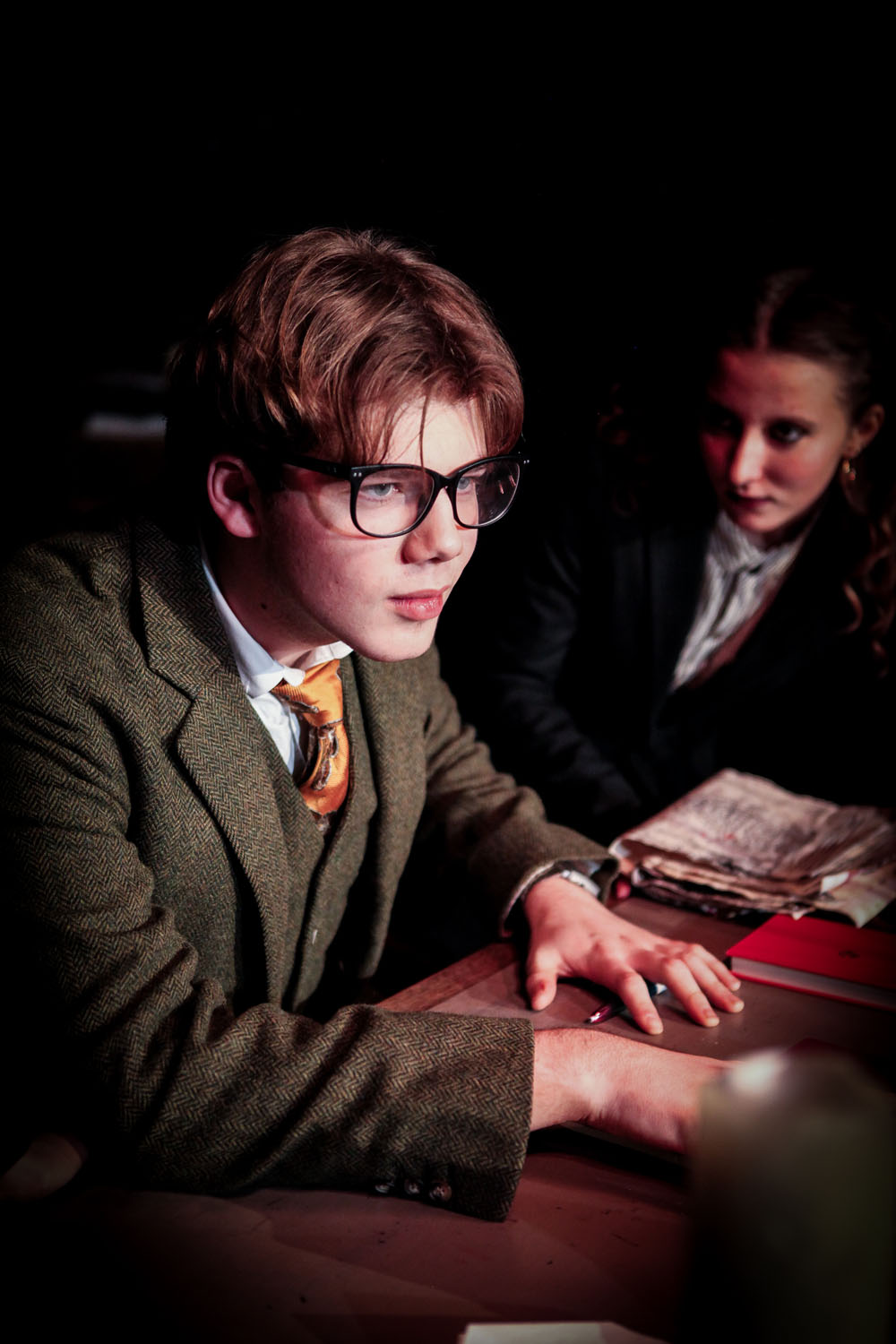
Jamie’s performance needed to be good and it was; his horror at the end needed the counterpoint of his earlier boredom, nonchalance and arrogance.
Mr Digby Don, Harrodian English Teacher
When Faustus, played by Jamie, reaches his final hour in this Harrodian production, the dread and regret is written clearly on his face. Jamie’s performance needed to be good and it was; his horror at the end needed the counterpoint of his earlier boredom, nonchalance and arrogance. As his soul is pulled into hell by crawling devils, accompanied by the Lacrimosa from Mozart’s Requiem, we feel Faustus's folly as much as an audience of 1592 might have done. Much like all the musical choices throughout the play, this was well-selected: Mozart was commissioned to write the Requiem, but as his health deteriorated in 1791, he became obsessed with the idea that he was writing it for his own funeral. He died that year, with the work unfinished. The idea that Faustus writes the script for his own death, his own requiem, is introduced at the very beginning of this Harrodian production when the Lacrimosa plays in the background, as Faustus begins to formulate his plan to turn to magic.
All photographs by Daisy Mackay
See more production pictures in our Dr Faustus gallery
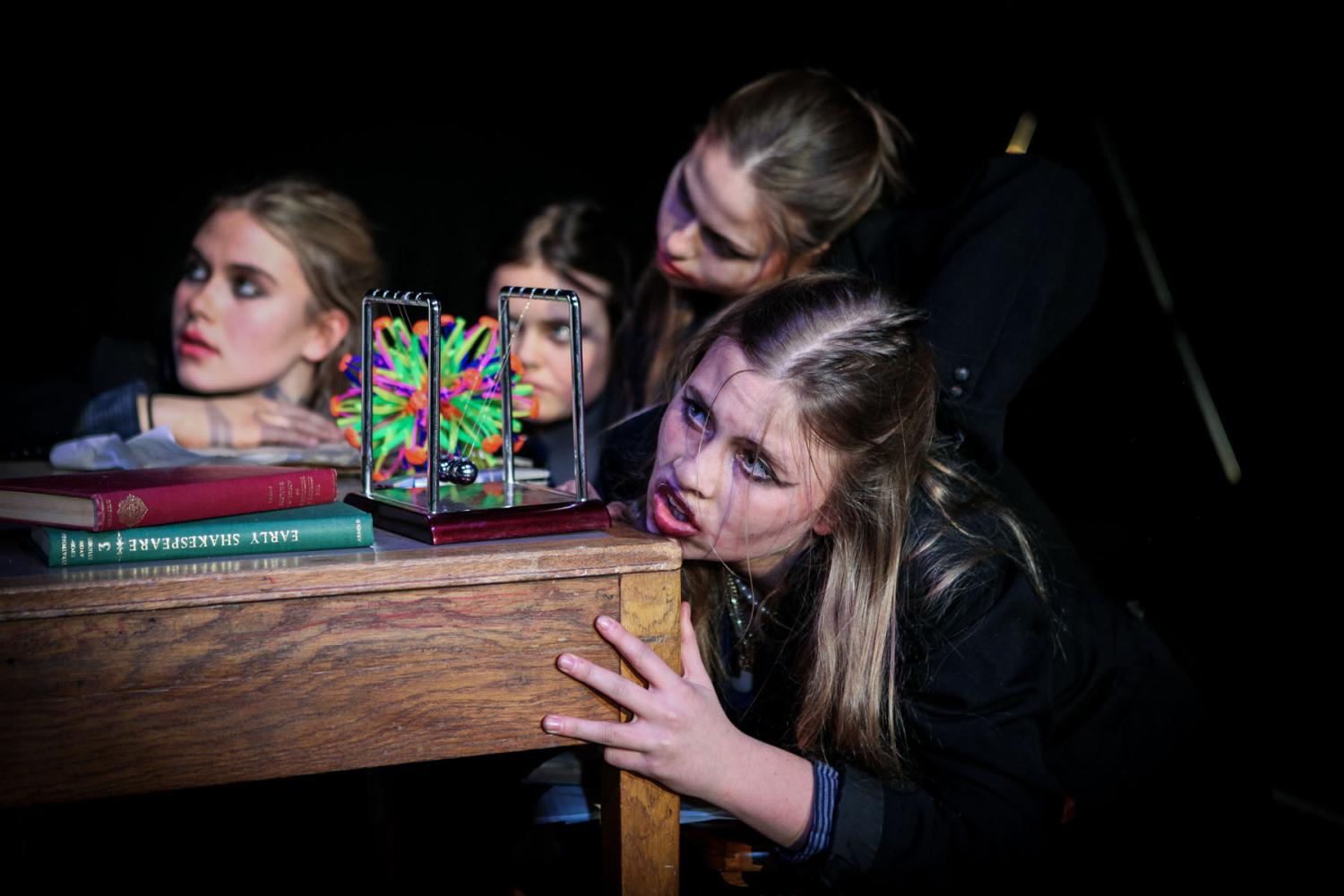 To stage and perform Faustus, in the first place, requires ambition, skill and an intelligent cast. Originally planned for 2021 (and shelved due to the pandemic) directors Mike Glen and Adam Lineker had a few years to ponder how to stage a play that spans 24 years, moving between different European courts and realms, before descending into Hell. How to put on a play that is a Tragedy, concerned with the serious and the philosophical and the religious questions, which is also punctuated with Pope-prodding and farce? How would our student actors manage the delicate balance?
To stage and perform Faustus, in the first place, requires ambition, skill and an intelligent cast. Originally planned for 2021 (and shelved due to the pandemic) directors Mike Glen and Adam Lineker had a few years to ponder how to stage a play that spans 24 years, moving between different European courts and realms, before descending into Hell. How to put on a play that is a Tragedy, concerned with the serious and the philosophical and the religious questions, which is also punctuated with Pope-prodding and farce? How would our student actors manage the delicate balance?
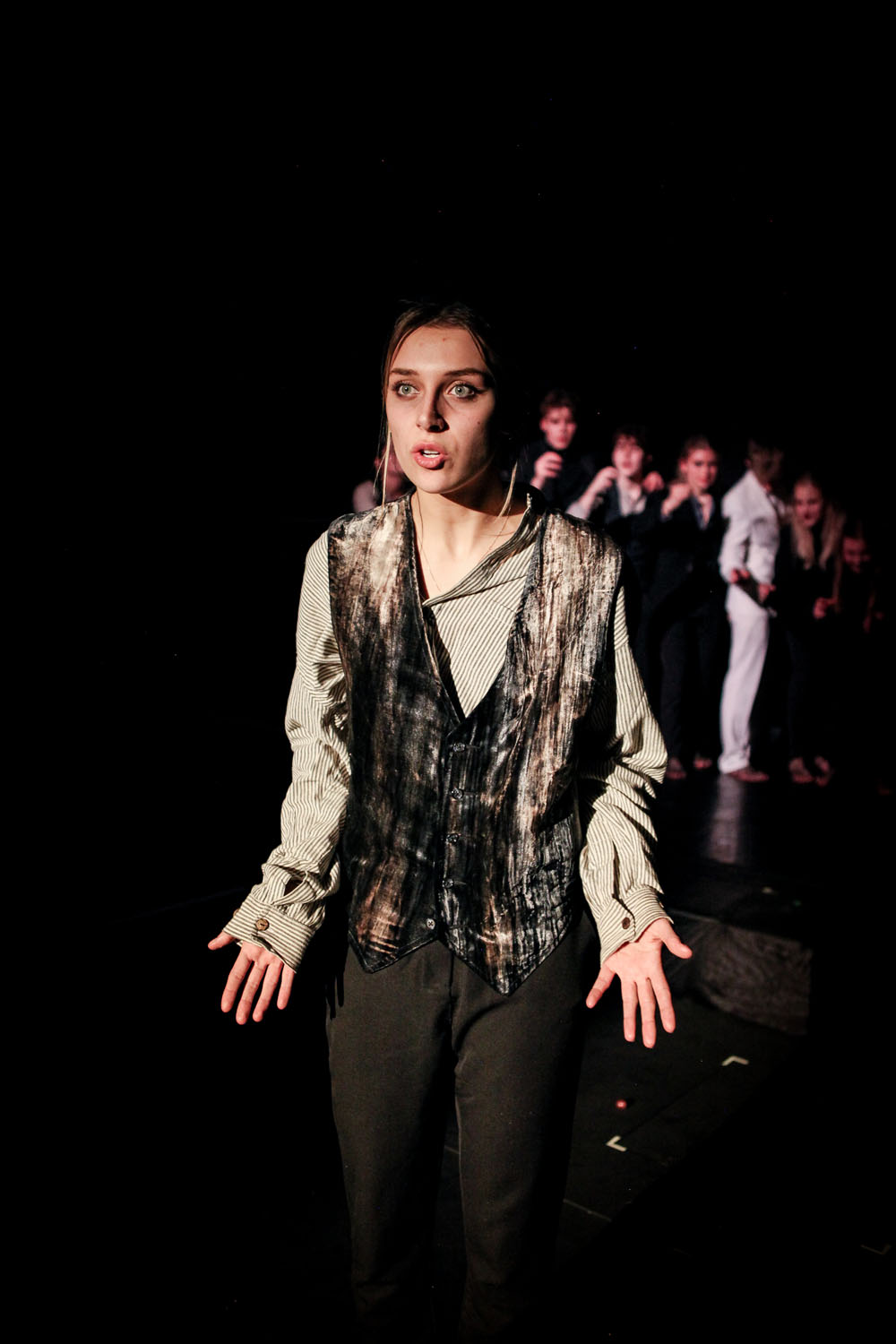 Entering the theatre, we notice that Faustus’s study is placed on a platform, serving as a setting for the first act. More than a study, rather a desk placed in the centre of bohemian students, lolling around listening to Nick Cave, while Faustus worked furtively. The scene was set around a protagonist that had clearly become untouchable and we were able to imagine how this had gone to his head.
Entering the theatre, we notice that Faustus’s study is placed on a platform, serving as a setting for the first act. More than a study, rather a desk placed in the centre of bohemian students, lolling around listening to Nick Cave, while Faustus worked furtively. The scene was set around a protagonist that had clearly become untouchable and we were able to imagine how this had gone to his head.

Cleverly (I thought) Lucifer entered from the back of the theatre, walking through the audience, introducing Faustus with the lines usually given to the chorus: ‘Till, swollen with cunning of a self-conceit, / His waxen wings did mount above his reach’. Luci was back as the villain, having played Lady Macbeth two years ago. Her entrance to the lower part of the stage at the start was contrasted with her triumphant entrance from the platform at the end of the play. It was made clear that her plan had worked.
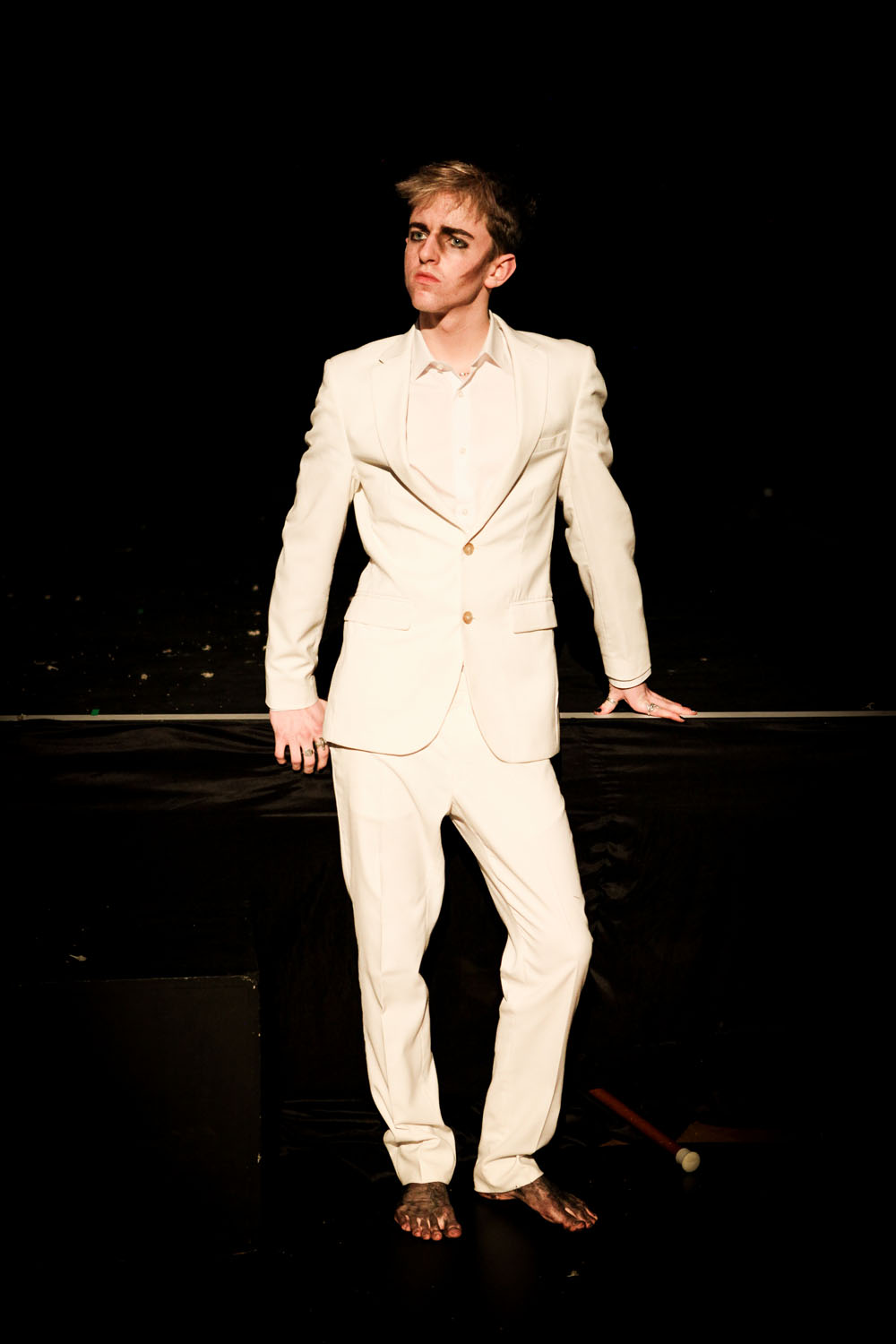
Brilliantly bolshy, bored and beleaguered, like all the characters (apart from Faustus), Mephistopheles sported blackened bare feet, which contrasted sharply with his slick white suit.
Act one was gripping. With many of the pranks and stunts pushed towards the second act of the play, it was a pleasure to experience the tension and rising action of act one played-out so well. The characters ‘on Faustus’s shoulder’ were acted with dynamism and understanding. The servant, Wagner, played by Phoebe, delivered her lines with such crispness and charisma that we hung on each word. The two magicians, Valdes and Cornelius (not a good influence) played by Willow and Talia were charismatic but dangerous companions. Before disappearing from the stage for good, they were able to hint at the limits of their own magical skills, suggesting that they would run, rather than to the Devil too. The good and the bad angel are used by Marlowe to good effect and here were played intelligently by Lucy and Ebba respectively. Each time the earnest advice of the good was turned with choice words of the bad so ‘that wealth and power shall be his’.
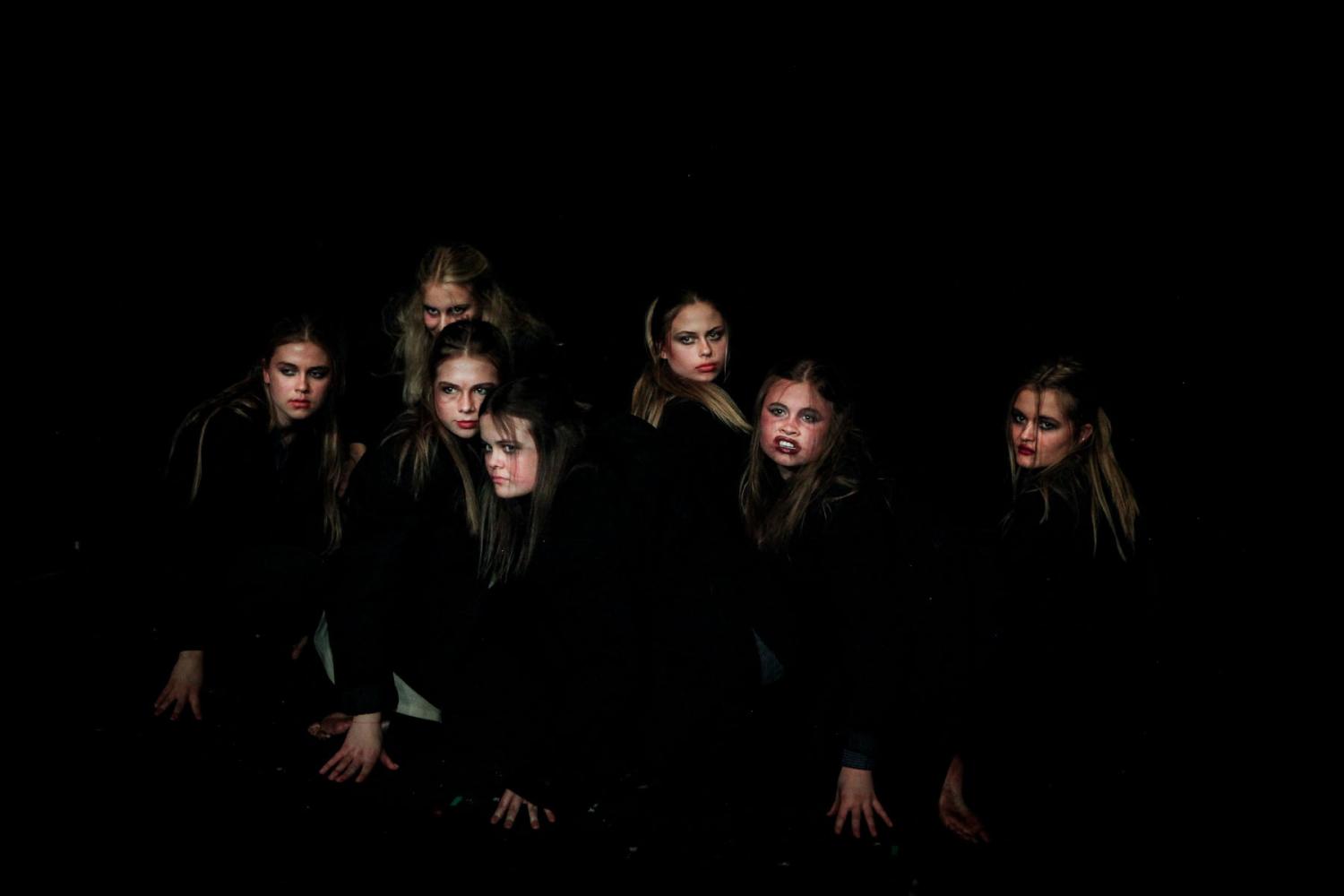 Enter Mephistopheles (Act one, scene three). With a little help from Valdes and Conelius, Faustus summons Lucifer’s servant. Alfie returned to the Harrodian stage, having taken a seven year break, as brilliantly bolshy, bored, beleaguered. Like all characters (apart from Faustus) he sported blackened bare feet, which contrasted sharply with his slick white suit. He is very effective, moving from obsequiousness, ‘What is it Faustus doth desire? / I am a servant to your will’, to remind him of the uncomfortable truth, ‘Hell hath no limits, nor is circumscribed’. Faustus becomes frustrated when Mephistopheles cannot fully reply to questions such as, ‘what is the thing that men / Call the universe’ and we are reminded, perhaps, that some questions will never be answered, whether by human beings or AI bots. I thought that Mephistopheles’s growing power over his subject was demonstrated effectively when he took up Faustus’s chair at his desk. As Faustus became entranced below by the show of the seven deadly sins (these actors were excellent), Alfie took the seat, on the stage, and watched-on smirking.
Enter Mephistopheles (Act one, scene three). With a little help from Valdes and Conelius, Faustus summons Lucifer’s servant. Alfie returned to the Harrodian stage, having taken a seven year break, as brilliantly bolshy, bored, beleaguered. Like all characters (apart from Faustus) he sported blackened bare feet, which contrasted sharply with his slick white suit. He is very effective, moving from obsequiousness, ‘What is it Faustus doth desire? / I am a servant to your will’, to remind him of the uncomfortable truth, ‘Hell hath no limits, nor is circumscribed’. Faustus becomes frustrated when Mephistopheles cannot fully reply to questions such as, ‘what is the thing that men / Call the universe’ and we are reminded, perhaps, that some questions will never be answered, whether by human beings or AI bots. I thought that Mephistopheles’s growing power over his subject was demonstrated effectively when he took up Faustus’s chair at his desk. As Faustus became entranced below by the show of the seven deadly sins (these actors were excellent), Alfie took the seat, on the stage, and watched-on smirking.
For me, the most powerful moment of the play came just before the interval. Faustus fantasises about sending spirits to bring him earthly wealth, pleasure and knowledge:
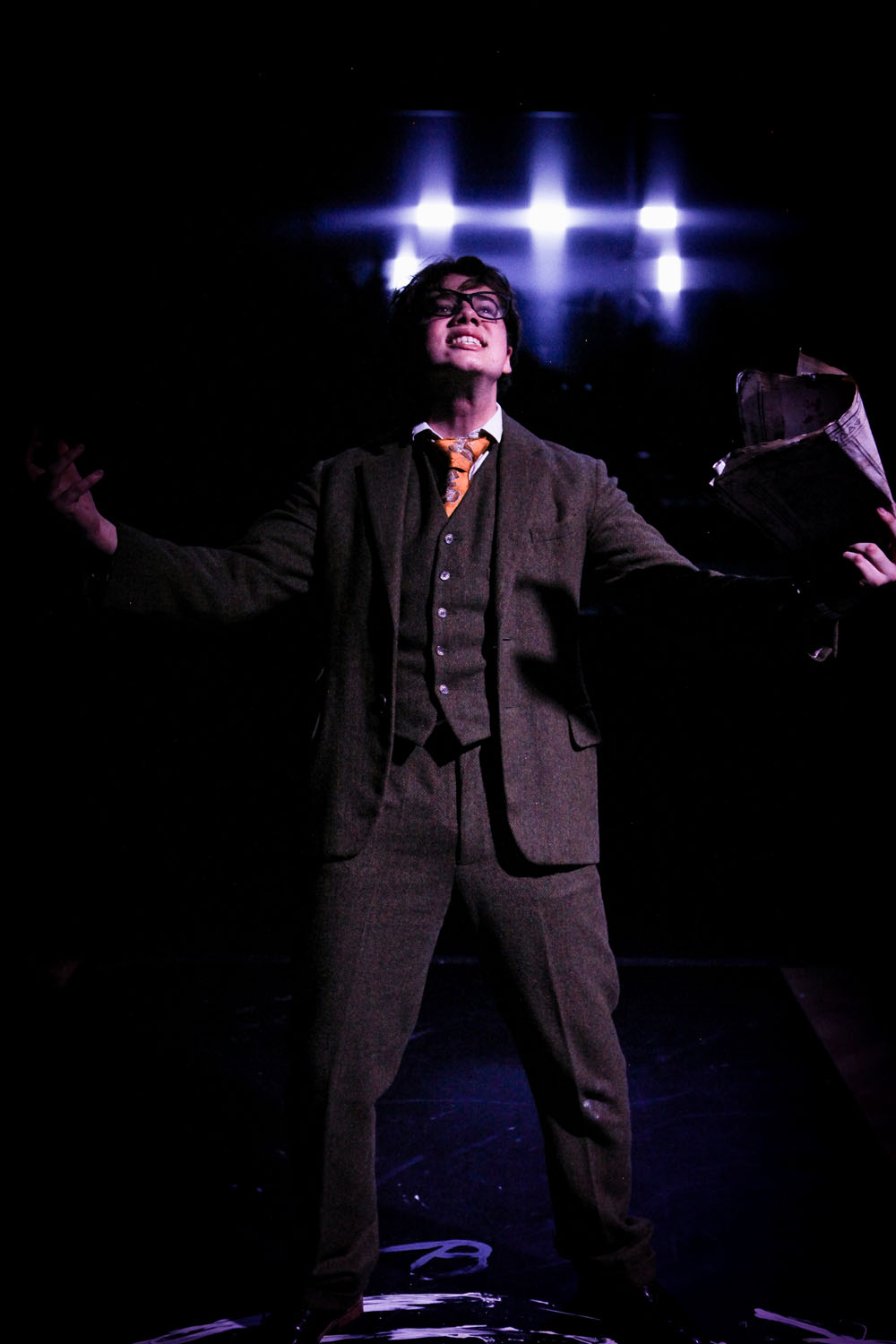
'Shall I make spirits fetch me what I please? Resolve me of all ambiguities? Perform what desperate enterprise I will?
I'll have them fly to India for gold, Ransack the ocean for orient pearl, And search all corners of the new-found world, For pleasant fruits and princely delicates;
I'll have them read me strange philosophy, And tell the secrets of all foreign kings.'
This was set to Purcell’s Funeral March for Queen Mary, which many will have recognised from the opening to Kubrick’s ‘A Clockwork Orange’. Faustus’s restless excitement at the possibility of his own power was made to seem all the more sinister, all the more ominous, and all the more doomed.
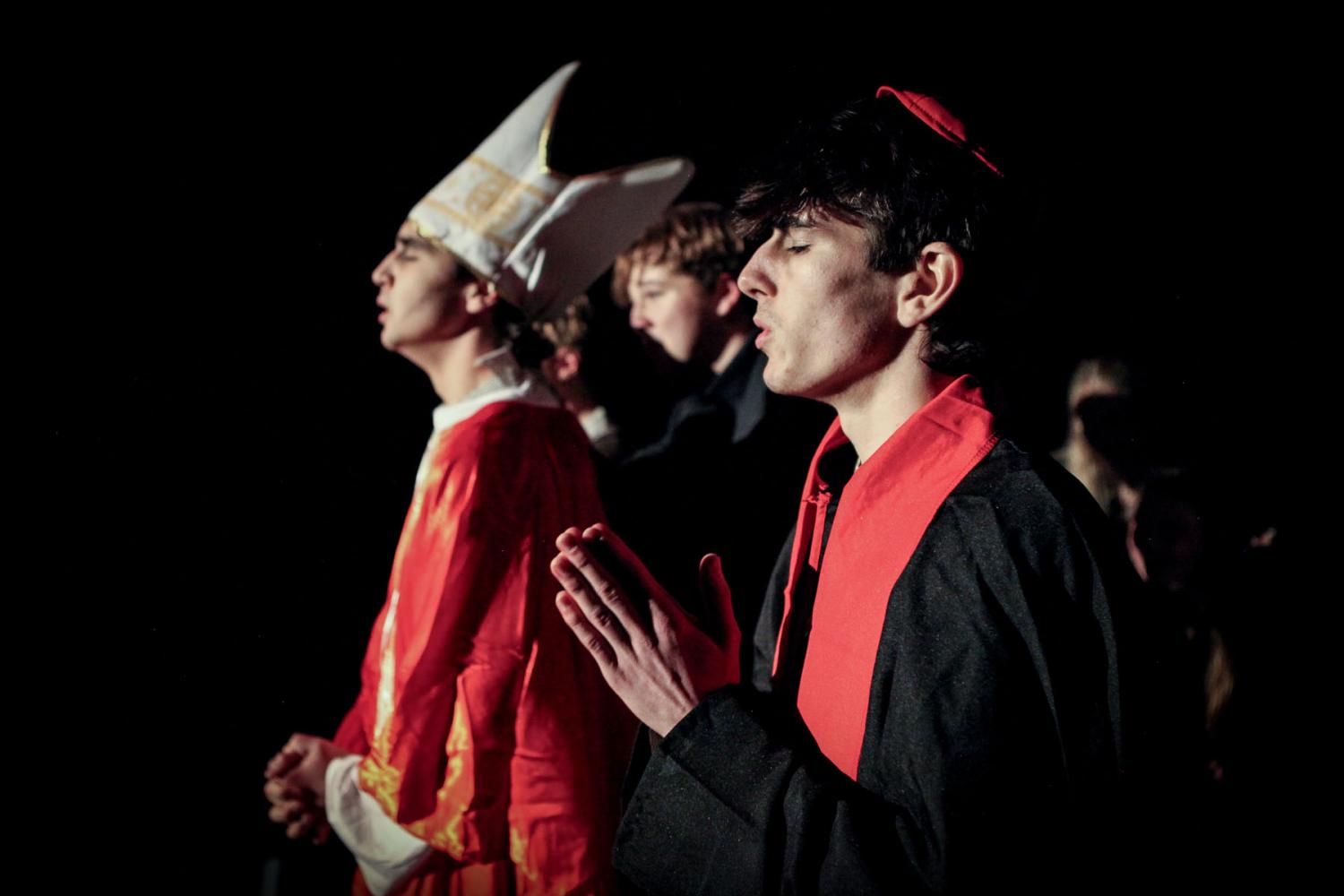
After the interval, Faustus’s desk had been moved down to the lower section to stage, in a thoughtful move. There followed a series of comic scenes and a series of stunts. Robin and Rafe (Orson and Thomas) were excellent as the comic relief, summoning Mephistopheles and regretting it. Faustus and his entourage then visit the Pope and bait him. This was very funny, played by Thomas R. While Marlowe clearly enjoyed writing this scene as a thinly veiled jab at the decadence of the Catholic church, this moment in the play showcases Faustus’s descent into frivolity and purposelessness.
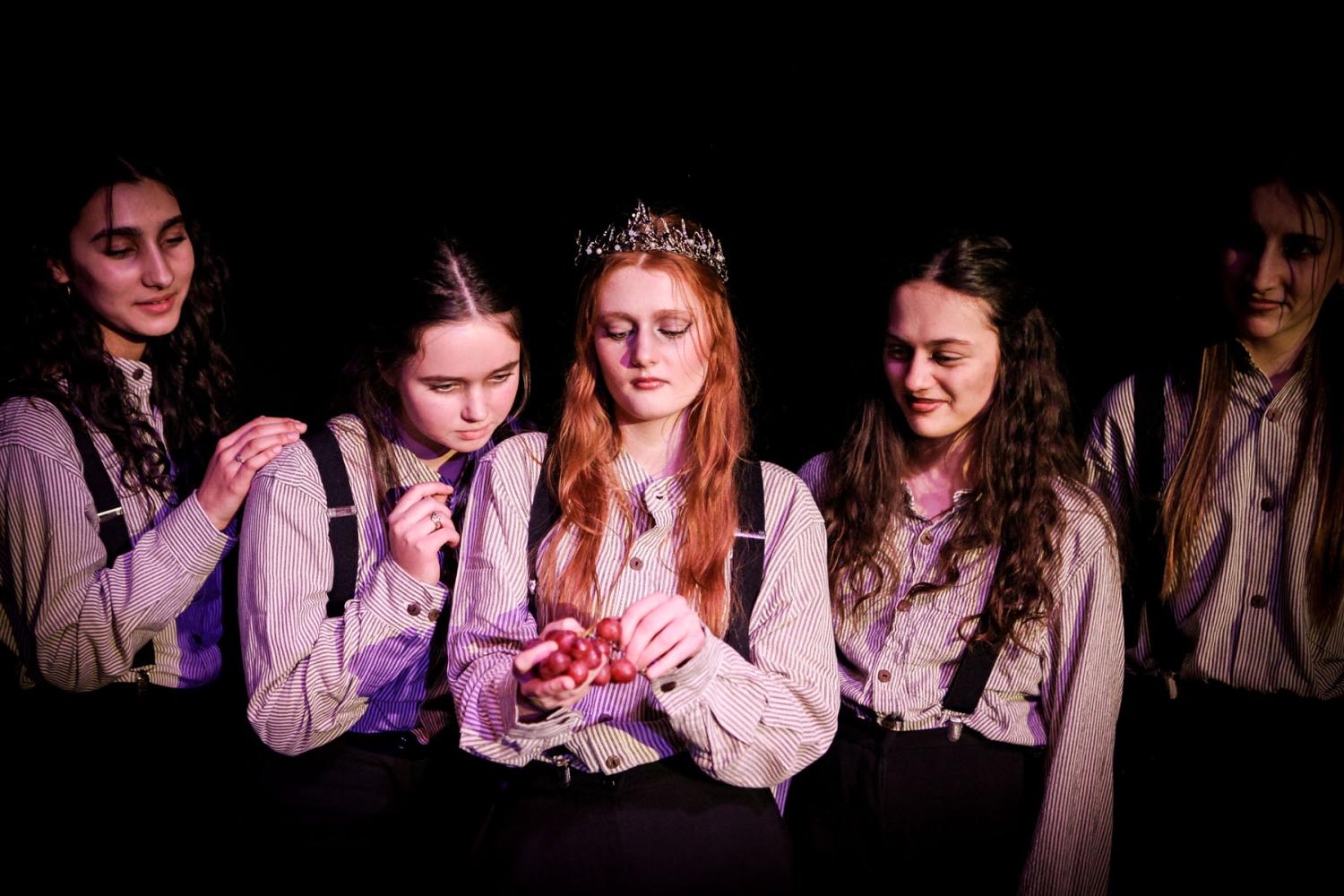
The pointlessness of Faustus’s existence is shown in his travels around Europe with grumpy Mephistopheles (these photographs were projected onto the screen to good effect). Again, it is shown in his visit to the Holy Roman Emperor, where he conjures a likeness of Alexander the Great. Amelia (Empress) was fawning while her husband (played by Philippos) is sceptical and given antlers for his trouble. Later, in a visit to the Duke of Vanholt (Jack) and the Duchess (Sasha) Faustus conjures grapes. At the height of his power, Faustus achieves nothing and Jamie captures the decline into despair, ‘O, what art thou, Faustus, but a man condemned to die?’ The final wish to conjure Helen of Troy is sad, as much as anything.
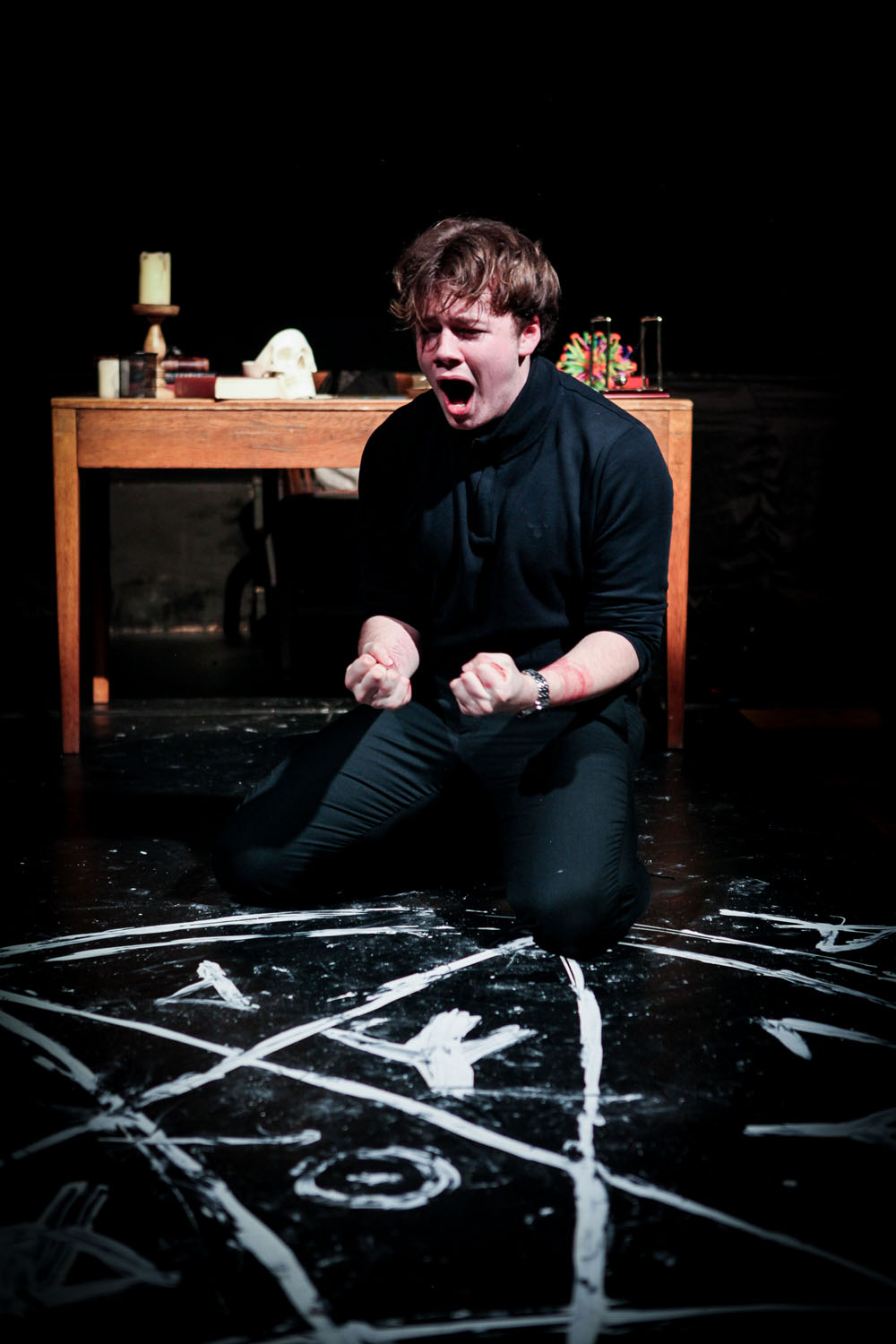
As his soul is pulled into hell by crawling devils, accompanied by the Lacrimosa from Mozart’s Requiem, we feel Faustus's folly as much as an audience of 1592 might have done
Digby Don, Harrodian English Teacher
Of Tragedy and tragic plays, the critic A.D. Nuttall suggests that if we ‘go again and again to see such things [we] must in some way enjoy them.’ If we go back to see plays such as Dr Faustus then we must find some pleasure in it, else we’d stay at home. From where does this pleasure arise? We cannot take much pleasure from Faustus’s struggle; he is certainly not a tragic protagonist striving to uphold his dignity, as Arthur Miller argued a tragic hero should. Does Faustus even have a redeeming feature? His intellect? His scholarship? The latter seems to be scorched by the time the play opens. Is it the pleasure of witnessing misfortune - the schadenfreude - of watching this protagonist ‘sell his soul to the devil’? This seems too simplistic. Perhaps pleasure comes from the education of learning from Faustus’s mistake? Or something else entirely?
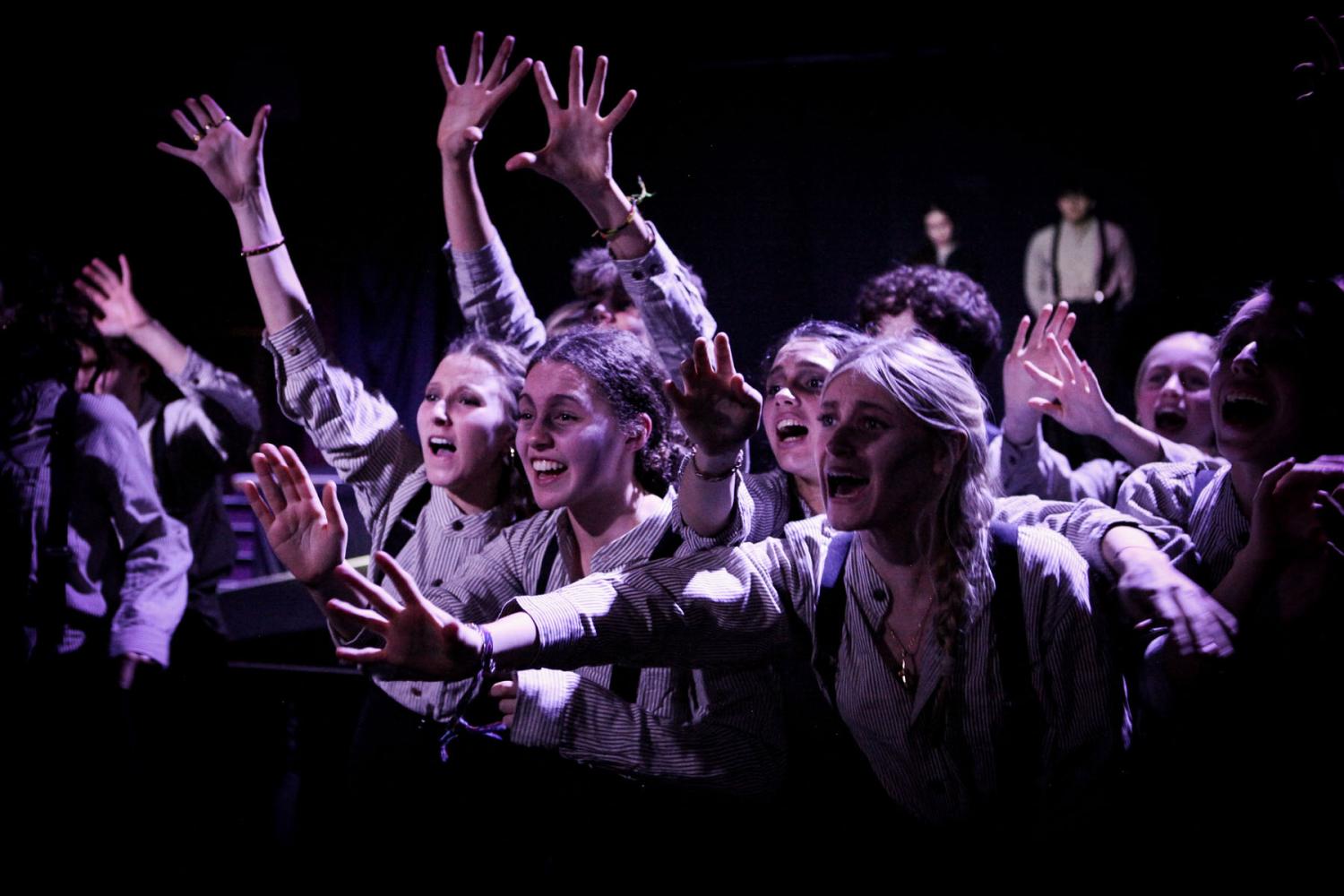
Dr Faustus showcased the talents of our student actors, some of whom have been in three or four school productions, of different genres. Harrodian theatre continues to demonstrate its versatility and ambition and the school is a better place for it
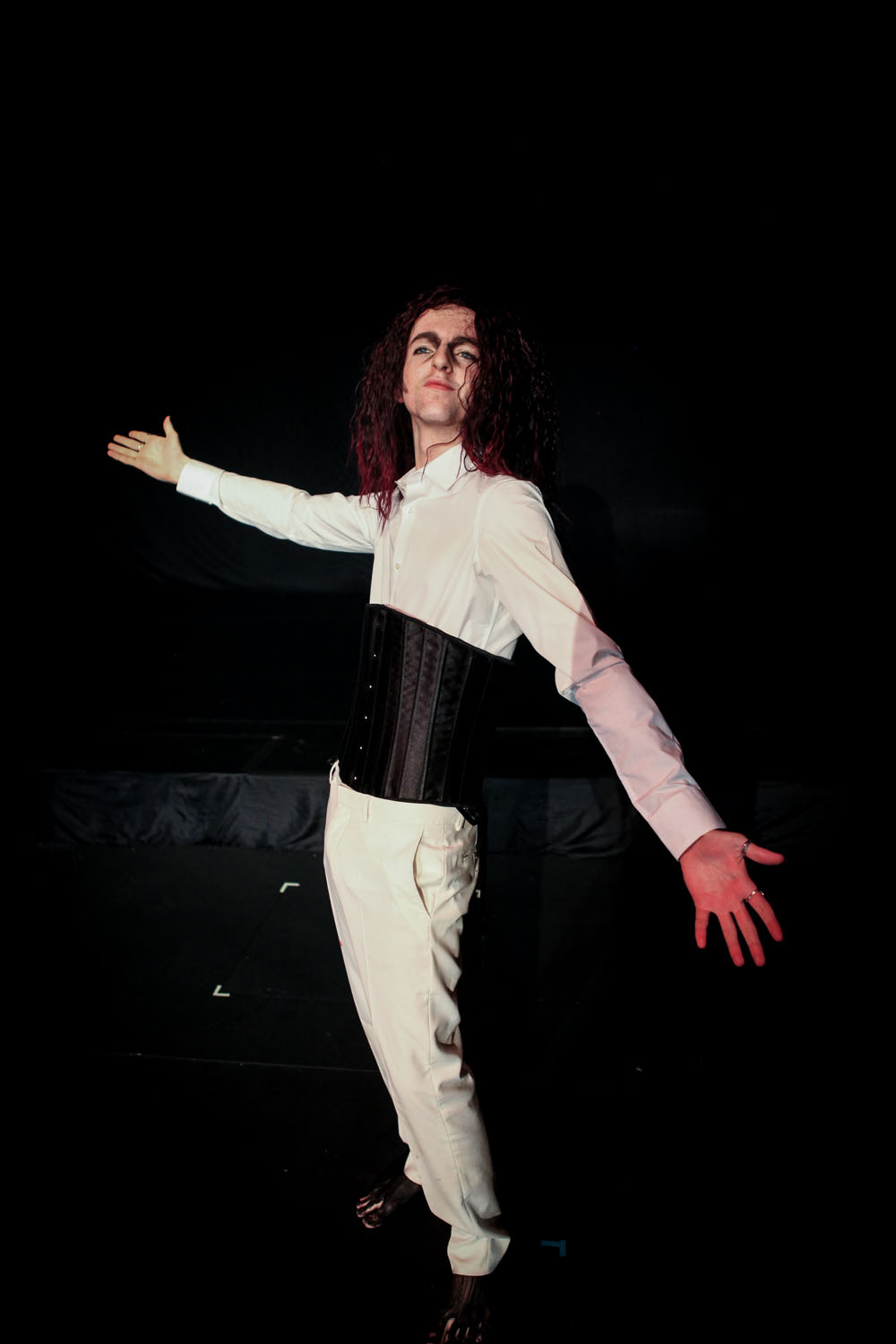
Harrodian’s production of Dr Faustus was indeed a pleasure to watch. Yes, it made me think of the questions above but it was also mischievous, irreverent, daring and funny, much like I imagine Marlowe to have been. The play showcased the talents of pupil actors, some of whom have been in three or four school productions, of different genres. Harrodian theatre continues to demonstrate its versatility and ambition and the school is a better place for it.
